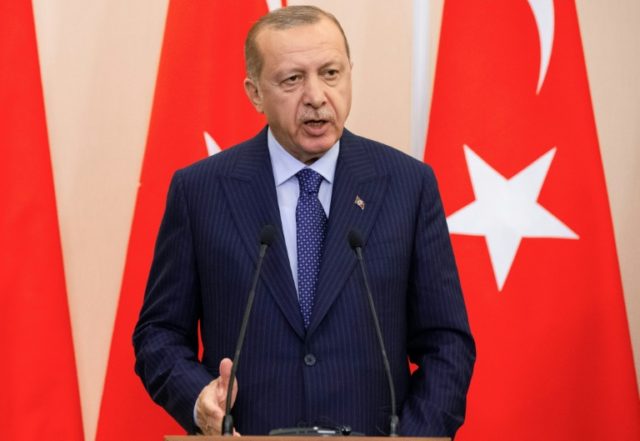A spokesman for the Turkish presidency insisted on Monday that Ankara does not recognize Bashar al-Assad as the legitimate leader of Syria after President Recep Tayyip Erdogan publicly admitted his government maintains diplomatic ties with the Assad regime.
Erdogan has spent years demanding Assad – who controls the capital Damascus and, with help from Russian and Iranian forces, has eradicated much of the opposition to his rule in the country – step down and allow for Sunni Arabs to run the country. Assad is an Alawite Shiite allied with the Iranian Shiite regime and the son of late dictator Hafez al-Assad.
Turkish forces collaborate with Sunni Syrian rebel groups on the ground, ostensibly to fight Assad but more practically to contain the Syrian Kurdish People’s Protection Units (YPG), an anti-jihadist U.S. ally that Erdogan considers a terrorist group.
In a television interview Sunday, Erdogan surprised the country by admitting that his diplomats “conduct foreign policy on low levels” with Assad. Erdogan insisted, however, that he has no personal communication with Assad.
“Even if it’s your enemy, you will not break the rope completely. Because you might need that rope some time,” Erdogan explained, according to Hurriyet.
Following the interview, Turkish news outlet NTV reported that Erdogan’s Foreign Ministry was preparing to appoint a special representative for the Syrian situation on Wednesday. Authorities speaking anonymously to the outlet insisted that the new envoy was necessary as part of the shift Turkey is making from a parliamentary to a presidential government, which began in 2017 after a close referendum in which Turks were asked to vote on whether to greatly expand Erdogan’s power. Opposition party members accused Erdogan of suppressing the vote in regions that did not support him to ensure a victory.
Ibrahim Kalin, Erdogan’s spokesman, responded to the controversy surrounding the president’s comments on Monday, arguing that establishing diplomatic relations with a head of government does not mean that Turkey recognizes that government.
“Turkish intelligence departments may sometimes have contacts with various [Assad] regime elements in al-Hasakah and Qamishli, including Damascus [government], in the framework of Turkey’s security and the overall safety of Turkish operations in Syria,” Kalin clarified, according to the state-run Anadolu news agency. “This does not mean that Turkey recognizes the legitimacy of the [Syrian] regime.”
Erdogan’s remarks on communication with the Assad regime came as a shock to many given the Turkish president’s repeated demands that Assad step down and refusal to acknowledge his presidency as legitimate. In 2016, Erdogan went as far as to declare that the presence of Turkish troops in Syria was exclusively to overthrow Assad.
“Why did we enter? We do not have an eye on Syrian soil. The issue is to provide lands to their real owners. That is to say we are there for the establishment of justice. We entered there to end the rule of the tyrant al-Assad who terrorizes with state terror,” he announced, clarifying that Turkish soldiers are not in Syria “for any other reason.”
In the past year, however, as the Islamic State’s influence in the country has diminished, Erdogan has focused more on using Turkish troops to attack the Syrian Kurds indigenous to northern Syria, and particularly the YPG/YPJ militia. Ankara insists that the YPG is a terrorist organization indistinguishable from the Kurdistan Workers’ Party (PKK), a Marxist, U.S.-designated terrorist organization. YPG leaders insist that they run an operation separate from the PKK, even though both organizations aspire to the creation of a sovereign Kurdistan. The YPG is the main component of the U.S.-backed Syrian Defense Forces (SDF), which liberated Raqqa from the Islamic State.
Turkey has largely refrained from military action against the Kurds because the United States maintains troops in Kurdish areas in northern Syria. President Donald Trump’s announcement that he would soon withdraw American soldiers from the region last year triggered immense speculation that a Turkish invasion was imminent. Pro-Erdogan Turkish media suggested in January that 80,000 Turkish troops had prepared to invade Manbij, a city in northern Syria held by the YPG.
President Trump warned Turkey in January that the United States would “devastate” it economically if Ankara chose to attack the YPG, leading to another pause in Turkish military activity in the region. Since that warning, Erdogan and Trump have reportedly spoken on the phone to prevent clashes between Turkish and U.S. troops, both of whom are members of NATO. Erdogan has reportedly insisted that the United States is incorrect not to view the YPG as a “terrorist organization”.

COMMENTS
Please let us know if you're having issues with commenting.